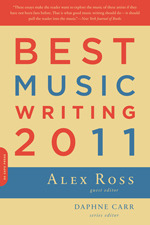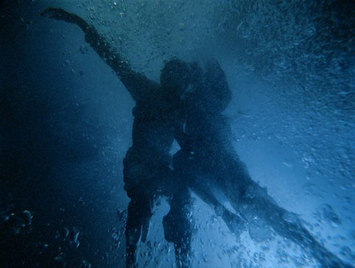Alex Ross's Blog, page 210
November 26, 2011
Adding emotion to Wagner
David Ng, in the Los Angeles Times, explores two current movies that employ Wagner on their soundtracks: David Cronenberg's A Dangerous Method and Lars von Trier's Melancholia. I have yet to see the Cronenberg film, which evidently features Lang Lang playing the Siegfried Idyll, but I did endure Melancholia, as I commented in a previous post. What did von Trier and his collaborators think they were doing when they carpeted their movie with swatches of Tristan? Kristian Eidnes Andersen, the sound designer, explains to Ng that he retouched the Tristan prelude to "get more into the emotions." As Stephen Sondheim might say, "Wow."
November 24, 2011
Thanksgiving Miscellany
On Saturday night, the fetchingly named Le Train Bleu, an eclectic new group under the direction of Ransom Wilson, will perform John Luther Adams's songbirdsongs at Galapagos. It's an old-yet-new JLA piece, here presented for the first time in a large-scale version for eight piccolists and six percussionists.... Both John Adamses figure in the program of the Ojai Festival next June. The schedule, devised by Leif Ove Andsnes, also includes Marc-André Hamelin playing the Concord Sonata, Barbara Sukowa singing Reinbert de Leeuw's Im wunderschönen Monat Mai, and Martin Fröst essaying all manner of clarinet music.... Michael Lorenz, writing in Acta Mozartiana, reveals the existence of a previously unknown godson of Mozart: Wolfgang Amade Nebe (1787-1839), who later became a Viennese civil servant.... The schedule for "After the End of Music History," a February symposium celebrating Richard Taruskin, has been announced.... Richard Dyer assesses James Levine's tenure in Boston and considers some of his possible successors.... There's been a welcome uptick of activity at Sedgwick Clark's Musical America blog.... On Nov. 30, Sotheby's will auction off another big batch of music manuscripts and rare books. The lot includes Schumann's composing manuscript for Szenen aus Goethes "Faust," the autograph of Schnittke's Peer Gynt, various Britten materials, and a Mozart sketch-leaf with bawdy canons ("Difficile lectu mihi Mars" and "Bona nox! bist a rechta Ox"), not to mention an inscribed typescript of Paul Celan's "Todesfuge."
Great-grandfathers
On the right, Sgt. James S. Frederick, who fought with the First Wisconsin Cavalry in the Civil War, losing an arm during the assault on Fort Tyler in 1865; on the left, Rev. Basilios Lambrides, a Bulgarian-born, German-educated, American-based Greek Orthodox priest, who once helped to settle a potentially violent strike at a Utah copper mine by appearing among the miners in his vestments, holding his cross aloft. My parents have had slightly less dramatic lives, but I am ever grateful to be their son. Happy Thanksgiving!
November 23, 2011
For Montserrat Figueras
I'm deeply sad to hear that the Catalan soprano Montserrat Figueras, the wife of the viol player Jordi Savall and the heart of so many extraordinary performances by his various ensembles, has passed away at the age of sixty-nine. Figueras's style of singing early music was at once steeped in historical sources and animated by freewheeling personal expression; she had a phenomenal ability to make ancient song come alive in the present. She was, of course, the lead singer of "Un sarao de la chacona," Savall's legendary reimagining of the chacona dance, which I wrote about in 2005. A la vida bona!
November 22, 2011
Count Chailly
Has Leipzig turned Riccardo Chailly into a vampire, as this Decca cover vaguely suggests? No matter; the playing on his new Beethoven cycle with the Gewandhaus Orchestra is consistently fresh and vital. It may not displace the titans of the discography, but it's a thoroughly distinguished contribution. Orchestra-watchers will be giving close attention to Chailly's upcoming appearances with the Boston Symphony, in January. (The BSO are redesigning their website, and let me make a request: please offer an easy link to the entire season schedule, with composers, works, and artists visible. As I've complained before, maddeningly few orchestras properly highlight their schedules. Presently, Nashville, LA, and St. Louis have it right.)
November 21, 2011
Presumably not the Usher
Jason Shure sends in this photo from tonight's performance of Robert Ashley's That Morning Thing at the Kitchen. I saw the opera on Sunday afternoon; having developed a slightly obsessive relationship in college with "She Was a Visitor," the closing section of the piece, I was thrilled not only to witness the music live but to participate in the performance, the audience being asked to sing along with the phonemes of the phrase. It was the last event in a heavy-duty weekend that also included Peter Maxwell Davies's Kommilitonen!, at Juilliard; Philip Glass's Satyagraha, in the HD Live broadcast from the Met; and Honegger's Jeanne d'Arc au bûcher, courtesy of the Baltimore Symphony. Each had its virtues, but it was the Glass that left me really stunned. The work possesses an extraordinary aura, and, as Glass commented during one of the intermission features, current events have a way of catching up to it. I've been fairly critical of the Met in recent months, but for this flawless, deeply felt production there can be nothing but praise.
SONiC, Muhly, Ludovisi
In this week's New Yorker I have a column on various new-music developments: a quick survey of the SONiC Festival, with particular attention to Alex Mincek and Alex Temple, and comments on Nico Muhly's first two operas, Two Boys and Dark Sisters. Also in the magazine is Ariel Levy's profile of the Principessa Rita Boncompagni Ludovisi, formerly Rita Jenrette, whom I had the honor of meeting in Rome last June. Her home, the Villa Aurora, is an astounding place. Corey Brennan, whom I first got to know circa 1988 in his capacity as guitarist of Bullet LaVolta, appears in Ariel's piece in his current incarnation as the Andrew W. Mellon Professor-in-Charge of the School of Classical Studies at the American Academy in Rome.
Best Music Writing 2011
 I'm happy to say that Best Music Writing 2011, which I co-edited with Daphne Carr, is now arriving in bookstores. Two events will be held in New York to celebrate the contributors: one at powerHouse Arena, in Brooklyn, on Dec. 6, with Franklin Bruno, Wendy Lesser (writing on Georg Friedrich Haas), Jeremy Denk (lamenting brainless program notes), Nancy Griffin, Nitsuh Abebe, Lauren Puchowski, Vanessa Grigoriadis, Kelefa Sanneh, and Dave Tompkins; and the other at Housing Works Bookstore on Dec. 8, with Nate Chinen, Justin Davidson (on Beethoven), Joe Hagan, David Hadju, Jessica Hopper, Amy Klein, Jace Clayton, Caryn Ganz, and Chris Norris. An event at Politics and Prose, in Washington, DC, will follow in January.
I'm happy to say that Best Music Writing 2011, which I co-edited with Daphne Carr, is now arriving in bookstores. Two events will be held in New York to celebrate the contributors: one at powerHouse Arena, in Brooklyn, on Dec. 6, with Franklin Bruno, Wendy Lesser (writing on Georg Friedrich Haas), Jeremy Denk (lamenting brainless program notes), Nancy Griffin, Nitsuh Abebe, Lauren Puchowski, Vanessa Grigoriadis, Kelefa Sanneh, and Dave Tompkins; and the other at Housing Works Bookstore on Dec. 8, with Nate Chinen, Justin Davidson (on Beethoven), Joe Hagan, David Hadju, Jessica Hopper, Amy Klein, Jace Clayton, Caryn Ganz, and Chris Norris. An event at Politics and Prose, in Washington, DC, will follow in January.
November 20, 2011
The great Bruckner rumpus
A curious incident took place at Royal Festival Hall in London on Wednesday night. Osmo Vänskä was leading the London Philharmonic in Bruckner's Fourth Symphony — employing the rarely heard 1888 edition of the score — when an irate listener got up from his seat and began moving toward a distant exit, shouting all the while. "Rubbish!" "This is terrible!" and "Too slow!" were some of the exclamations attributed to him by eyewitnesses on Twitter. Norman Lebrecht stepped in with round-the-clock coverage of the aftermath, providing not only more on-the-ground accounts but also audio of the incident (see above) and an explanatory letter from the instigator. Fiona Maddocks, reviewing the concert in the Observer, says that the heckler was out of line; Vänskä's tempos were, in fact, "pretty brisk." I've never witnessed anything quite like this in a concert hall, although I have seen my share of disturbances, including a shouting match at a Kathleen Battle recital, the legendary Lorraine Hunt Lieberson Bach-cantata meltdown, and the mystifying "My name's Marilyn Mahler" episode of 2009.
The Bruckner audio was obtained — strictly for research purposes, we can be certain — by the musicologist Nigel Simeone, co-biographer of Messiaen and editor of a forthcoming edition of Leonard Bernstein's letters. There are two other delectable items on Nigel's YouTube channel: a Bruckner Third that goes lamentably awry and a Rite of Spring that meets a similar fate. No, it's not quite time yet for the Messiah on crack, but Christmas is right around the corner....
November 19, 2011
Melancholia, bile
Photo: Kira Perov. From Bill Viola's Tristan.
The other night I subjected myself to Lars von Trier's film Melancholia, whose soundtrack consists largely of bits and pieces of the prelude to Tristan und Isolde (with the Act III prelude added during the credits). I'll leave the fisking of the filmmaking to the New Yorker's Richard Brody and say just a few words about the use of Wagner, which manages to be at once clumsy, unoriginal, and perverse. Clumsy, because von Trier dwells so relentlessly on the opening of the prelude that it turns into a kind of cloying signature tune; repetition robs the music of its capacity to surprise and seduce the listener. There are horribly inept cuts and rearrangements. (The explanation that "it's supposed to be vulgar" is for me insufficient.) Unoriginal, because the slow-motion effects at the beginning seem borrowed from Bill Viola's sublime Tristan video, and because the Wagner-plus-explosion ending recalls Buñuel's immeasurably superior That Obscure Object of Desire (where the music is from Walküre). Perverse, because von Trier's aestheticized vision of the end of the world — "visually splendid and sonically romantic," as Brody says — buys into a cheap conception of Wagner as a bombastic nihilist. The fall of the gods in Götterdämmerung is a quick epilogue to a superbly detailed political, psychological, and spiritual narrative of their decline. The music isn't glorying in their destruction but anticipating the approach of a better world; it marks a change of regime. As I wrote in an essay last spring, Wagner gives us hope, however vague. Von Trier gave me little more than an infinite yearning that the credits would soon roll.
Previously: Björk on the hatred of originality.
Alex Ross's Blog
- Alex Ross's profile
- 425 followers








